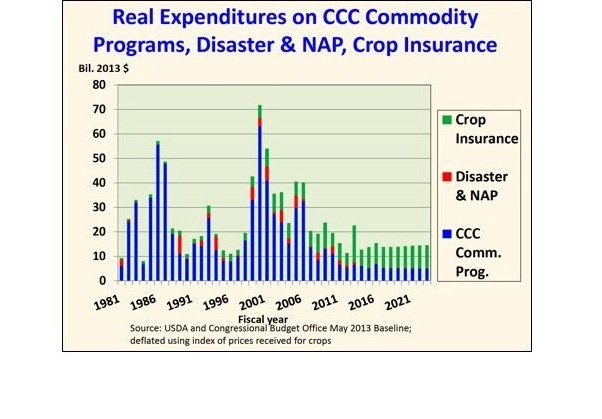November 21, 2013

As the worst drought in three decades unfolded last year, opponents of farm programs almost gleefully predicted that taxpayers would be on the hook for $40 billion in crop insurance claims this past fiscal year, according to a report from Farm Policy Facts (www.farmpolicyfacts.org).
Those “experts” grossly overestimated crop insurance costs by about $26 billion. And while crop insurance indemnities in fiscal year 2013 were understandably higher due to the epic drought, overall farm safety net spending was not higher.
Data recently presented by National Crop Insurance Services President Tom Zacharias and former USDA Chief Economist Keith Collins shows that, corrected for inflation in crop prices, total farm safety net expenditures were higher in fiscal years ’82, ’83, ’85, ’86, ’87, ’93, ’99, ’00, ’01, ’02, ’03, ’05, ’06, and ’09 than in ’13.
The reason that overall costs last year were kept down in the face of unparalleled weather disaster, according to Collins, is the combination of strong commodity prices and a policy evolution.
“The insurance system currently in place was specifically designed by Congress to displace costly ad hoc disaster payments,” he said. The rationale for the system is to provide farmers with more effective and predictable aid while shifting risk exposure away from taxpayers.
Unlike the old system of disaster payments, which are 100% taxpayer funded and drove up past farm policy costs, farmers now must buy crop insurance protection by paying premiums out of their own pockets. Farmers currently spend about $4 billion a year on premiums, and the accumulation of those premium dollars over the years is used to help offset claims in disastrous years.
In addition, farmers must absorb losses through an insurance deductible before receiving any assistance. These unreimbursed losses totaled $12.4 billion nationwide after the drought.
Go to the website to read the rest of the report: http://news.farmpolicyfacts.org/e_article002839249.cfm?x=bn0GLpH,bvks4mLP.
You May Also Like


